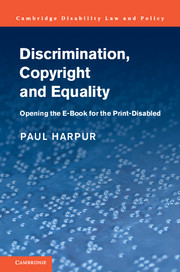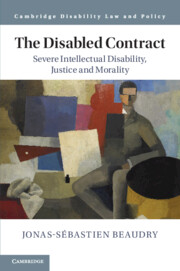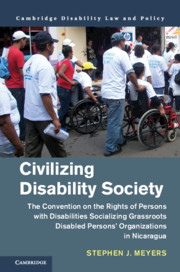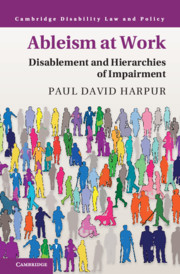Discrimination, Copyright and Equality
While equality laws operate to enable access to information, these laws have limited power over the overriding impact of market forces and copyright laws that focus on restricting access to information. Technology now creates opportunities for everyone in the world, regardless of their abilities or disabilities, to be able to access the written word – yet the print disabled are denied reading equality, and have their access to information limited by laws protecting the mainstream use and consumption of information. The Convention on the Rights of Persons with Disabilities and the World Intellectual Property Organization's Marrakesh Treaty have swept in a new legal paradigm. This book contributes to disability rights scholarship, and builds on ideas of digital equality and rights to access in its analysis of domestic disability anti-discrimination, civil rights, human rights, constitutional rights, copyright and other equality measures that promote and hinder reading equality.
- A valuable resource for advocates, law makers, librarians and others who seek to reform laws, policies and practices that reduce reading equality
- Provides a comparative analysis of how copyright and anti-discrimination laws interact
- Provides an in-depth analysis of advances in international and domestic laws
Product details
March 2017Adobe eBook Reader
9781108215978
0 pages
1 table
This ISBN is for an eBook version which is distributed on our behalf by a third party.
Table of Contents
- Foreword Gerard Goggin
- Acknowledgements
- Introduction
- 1. How technology has created the possibility of opening the book: from hard copy to e-books
- 2. Access to information communication technologies, universal design and the new disability human rights paradigm introduced by the Convention on the Rights of Persons with Disabilities
- 3. The weakening of the exception paradigm: the World Intellectual Property Organization changes path with the Marrakesh Treaty to Facilitate Access to Published Works for Persons Who Are Blind, Visually Impaired, or Otherwise Print Disabled
- 4. The role of copyright laws in restricting access to information and contributing to the book famine
- 5. Exceptions to rights-holders' exclusivity provides limited relief from the disabling impact of copyright
- 6. Anti-discrimination laws help protect persons with disabilities against digital disablement, but who qualifies for protection?
- 7. Causing digital disablement is not a trigger for regulation by anti-discrimination laws: ignoring capacity in favour of prescribed relationships
- 8. The prohibition against discrimination: regulating for equality through retrofitting inaccessible systems
- 9. Introducing positive duties in promoting equality outcomes for persons with disabilities: the United Kingdom Public Sector Equality Duty reducing digital disablement
- 10. The right to digital equality in action: protections under the Canadian Charter of Rights and Freedoms, and human rights acts
- 11. United States regulatory interventions targeting disability inclusive digital environments
- 12. The enforcement of legal duties: protecting copyright or promoting reading equality?
- Closing thoughts and new options to reduce digital disablement
- Appendix: list of anti-discrimination and civil rights laws and tribunals/commissions impacting on disability in the federal and state/province jurisdictions in Australia, Canada, the United Kingdom and the United States
- Index.






